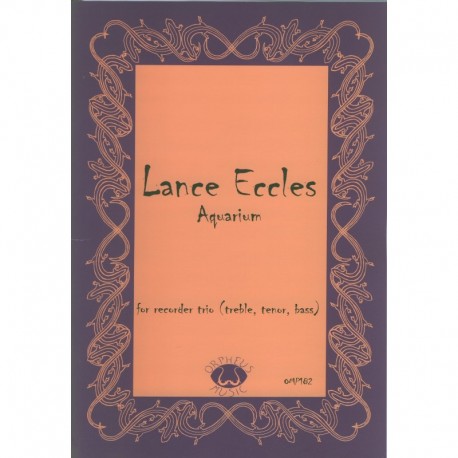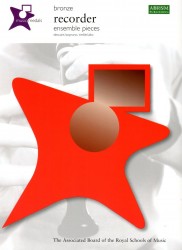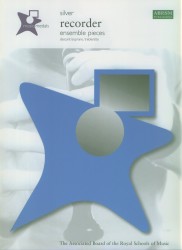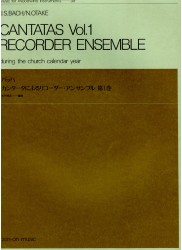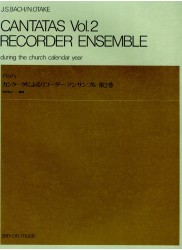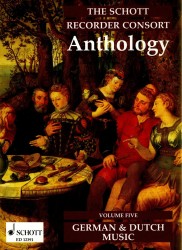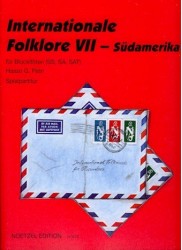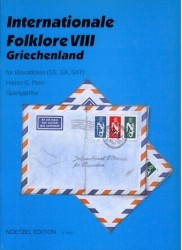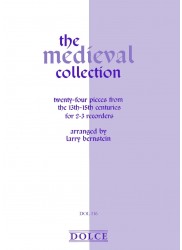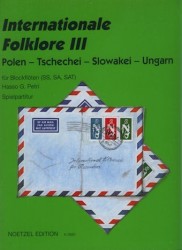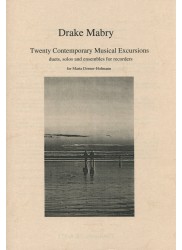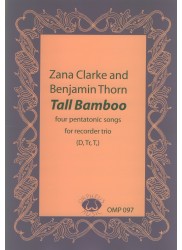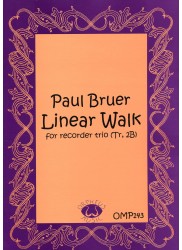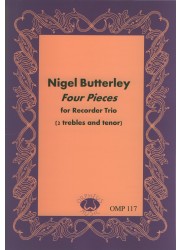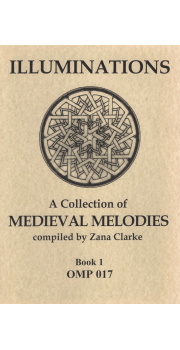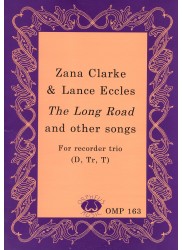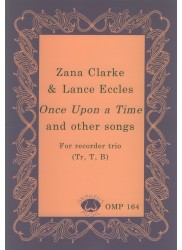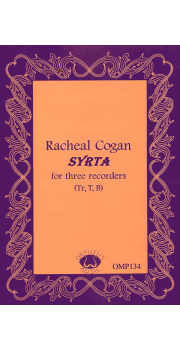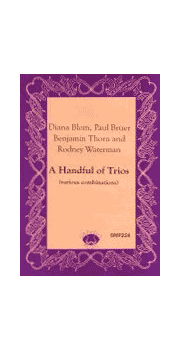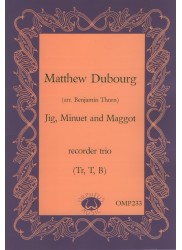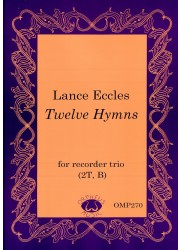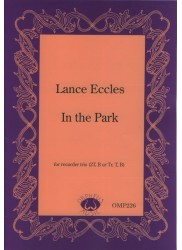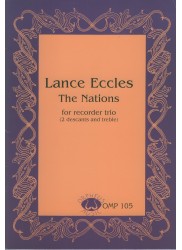No products
Prices are tax included
Aquarium
OMP182.pdf
PLEASE NOTE - DOWNLOADABLE PDF VERSION
Composer: Eccles - Lance
Instrumentation: Treble - Tenor - Bass
Period/genre: Australian Contemporary
Grade: Moderate
More info
*Contemporary Piece* in three movements. Set of three intriguing fishy character pieces.
1. Squid
2. Coelacanth
3. Bluebottles on the Waves
Please note that due to the automated delivery of virtual products including pdf downloads, PayPal payment is required at the checkout - we are unable to accept the cheque payment method for these items.
_Score 4 pp. Parts each 4 pp. Downloadable PDF file._
REVIEWS OF TEN COMPOSITIONS BY LANCE ECCLES
(Orpheus Music, orpheusmusic.com.au).
For 20 years, Lance Eccles was a member of the Reluctant Consort, a group based in Sydney, Australia. Most of his compositions have been written for this consort or for meetings of the Sydney Society of Recorder Players. Eccles is retired from his position as a senior lecturer in Chinese at Macquarie University. His current web site states that he is an "honorary senior research fellow in the Department of Ancient History at Macquaie University in Sydney, Australia"; see www.ocs.mq.edu.au/~leccles.
There are generalities that apply to many of the pieces reviewed here. The reader will note that all of the pieces have colorful programmatic titles. Sometimes, the music des indeed match the literary ideas of the titles. In this reviewer's opinion, there are other cases (as specifically noted below) where the literary images of the title and the actual music do not seem to connect. It may be, in some cases, that some words in these titles simply have other connotations in Australian culture. In any case, a simple solution for this problem would be for the publications to include information regarding the literary ideas behind the titles and how these ideas connect to the music.
Concerning his style, rhythms are straightforward and on the easier side, oftentimes using light syncopation. For the most part, the voices are very active, with a common exception being the bass lines. It is rare for the upper voices to hold any note longer than a halfnote, sometimes even in the final measures. Eccles has a remarkable ability to have voices moving every half beat for extended passages. He does a great job keeping his voices in lively contrary motion, but he also uses parallel motion to great effect. He likes abrupt endings.
Some of his music uses lush Romantic harmonies; some is more contemporary and mildly dissonant or even sharply dissonant. Eccles is equally at home in all these harmonic idioms. To enjoy hearing and playing Eccles's music, you will need a taste for contemporary harmony. Having said that the rhythms are easy, I should also mention that most of his music is quite chromatic. If your groups are interested in playing these pieces, get out the chromatic scales; you will need to know all chromatic fingerings.
Eccles likes to use phrase modulations to distantly-related keys. There are no avantgarde techniques in any of these pieces, beyond simple flutter-tonguing. If I had to rate them for difficulty on a scale of one to five, most would rate a three with exceptions noted below.
Regarding prices listed, Orpheus Music will remove taxes from the total for non- Australian customers. Prices vary day to day. These pieces are listed with two purchase options: the published version (in hard copy with the well-known purple and orange covers) and the .pdf instantly-downloadable version from orpheusmusic.com.au.
OMP182 Lance Eccles AQUARIUM.
This lovely impressionistic trio contains three short pieces. "Squid" opens with descending scales, creating an immediate ethereal atmosphere. Sometimes, the squid swim together, rising and falling. Other times, all parts take turns passing around a tritone (interval of three whole steps) on successive beats.
"Coelacanth" presents a somber andante with a descending bass line, descending sixths in the melody, and descending scales. That which descends needs to rise up again, and the composer handles the rising and falling so nicely. One especially exciting measure appears as all three parts suddenly climb up on different notes of an A Major triad.
"Bluebottles on the Waves" features at least one part (sometimes two parts) in syncopation against steady quarter notes (in one or more other parts).
Susan Groskreutz, American Recorder, January 2011.
30 other products in the same category:
Reference: 9781860966033
Brand: ABRSM
Music Medals: Bronze Recorder Ensemble Pieces
Composer: ABRSM Instrumentation: Descant/Treble - various combinations...
In StockReference: 9781860966040
Brand: ABRSM
Music Medals: Silver Recorder Ensemble Pieces
Composer: ABRSM Instrumentation: Descant/Treble - various combinations...
Out of stockReference: 509021
Brand: Zen-on
JS Bach Cantatas Church Year Vol 1
Composer: Bach - Johann Sebastian Arranger: N Otake Instrumentation: 2 - 5...
In StockReference: 509022
Brand: Zen-on
JS Bach Cantatas Church Year Vol 2
Composer: Bach - Johann Sebastian Instrumentation: 3 - 5 Recorders - various...
In StockReference: ED12391
Brand: Schott
Schott Recorder Consort Anthology: German & Dutch Music Vol 5
Composer: Various Arranger: Ed Bernard Thomas Instrumentation: 3 - 5...
In StockReference: N3875
Brand: Noetzel
International Folk Music Vol 7: South America
Composer: Traditional Arranger: Hasso Petri Instrumentation: Descant -...
In StockReference: N3910
Brand: Noetzel
International Folk Music Vol 8: Greece
Composer: TraditionalArranger: Hasso PetriInstrumentation: Descant - Treble -...
In StockReference: DOL116
Brand: Dolce
The Medieval Collection
Composer: Various Arranger: Larry Bernstein Instrumentation: Treble - Tenor...
In StockReference: N3880
Brand: Noetzel
International Folk Music Vol 3
Composer: TraditionalArranger: Hasso PetriInstrumentation: Various...
In StockReference: FEA171
Brand: Flautando Edition
Twenty Contemporary Musical Excursions
Composer: Mabry - Drake Instrumentation: Treble/2 Trebles/3 Trebles...
In StockReference: OMP097
Brand: Orpheus Music
Tall Bamboo
Composer: Thorn/ClarkeInstrumentation: Descant - Treble - TenorPeriod/genre:...
In StockReference: OMP097.pdf
Brand: Orpheus Music
Tall Bamboo
PLEASE NOTE - DOWNLOADABLE PDF VERSION Composer: Thorn/ClarkeInstrumentation:...
$19.00 -20%In StockReference: OMP143
Brand: Orpheus Music
Linear Walk
Composer: Bruer - PaulInstrumentation: Treble - 2 BassesPeriod/genre:...
In StockReference: OMP117
Brand: Orpheus Music
Four Pieces for Recorder Trio
Composer: Butterley - Nigel Instrumentation: 2 Trebles - Tenor...
In StockReference: OMP117.pdf
Brand: Orpheus Music
Four Pieces for Recorder Trio
PLEASE NOTE - DOWNLOADABLE PDF VERSION Composer: Butterley - Nigel...
$20.50 -20%In StockReference: OMP017
Brand: Orpheus Music
Illuminations Vol 1
Composer: Clarke - Zana Instrumentation: Descant/Treble/Tenor - solos and...
In StockReference: OMP163
Brand: Orpheus Music
The Long Road and other songs
Composer: Clarke/EcclesInstrumentation: Descant - Treble - TenorPeriod/genre:...
In StockReference: OMP163.pdf
Brand: Orpheus Music
The Long Road and other songs
PLEASE NOTE - DOWNLOADABLE PDF VERSION Composer:...
$19.00 -20%In StockReference: OMP164
Brand: Orpheus Music
Once upon a Time and other songs
Composer: Clarke/EcclesInstrumentation: Treble - Tenor - BassPeriod/genre:...
In StockReference: OMP164.pdf
Brand: Orpheus Music
Once upon a Time and other songs
PLEASE NOTE - DOWNLOADABLE PDF VERSION Composer:...
$20.50 -20%In StockReference: OMP134
Brand: Orpheus Music
Syrta
Composer: Cogan - Racheal Instrumentation: Treble - Tenor - Bass...
In StockReference: OMP134.pdf
Brand: Orpheus Music
Syrta
PLEASE NOTE - DOWNLOADABLE PDF VERSION Composer: Cogan -...
$17.50 -20%In StockReference: OMP224*
Brand: Orpheus Music
A Handful of Trios
Composer: Blom, Bruer, Thorn & Waterman Instrumentation: Various trios
In StockReference: OMP224.pdf
Brand: Orpheus Music
A Handful of Trios
PLEASE NOTE - DOWNLOADABLE PDF VERSION ONLY. Composer: Blom, Bruer, Thorn &...
$20.50 -20%In StockReference: OMP233*
Brand: Orpheus Music
Jig, Minuet and Maggot
Composer: Dubourg - Matthew Instrumentation: Treble - Tenor - Bass...
In StockReference: OMP233.pdf
Brand: Orpheus Music
Jig, Minuet and Maggot
PLEASE NOTE - DOWNLOADABLE PDF VERSION Composer: Dubourg - Matthew...
$17.50 -20%In StockReference: OMP270
Brand: Orpheus Music
Twelve Hymns
Composer: Eccles - Lance Instrumentation: 2 Tenors - Bass Period/genre:...
In StockReference: OMP226
Brand: Orpheus Music
In the Park
Composer: Eccles - LanceInstrumentation: 2 Trebles - Treble/Bass - Tenor -...
In StockReference: OMP226.pdf
Brand: Orpheus Music
In the Park
PLEASE NOTE - DOWNLOADABLE PDF VERSION Composer: Eccles -...
$19.00 -20%In StockReference: OMP105
Brand: Orpheus Music
The Nations
Composer: Eccles - LanceInstrumentation: Descant - Treble -...
In Stock

